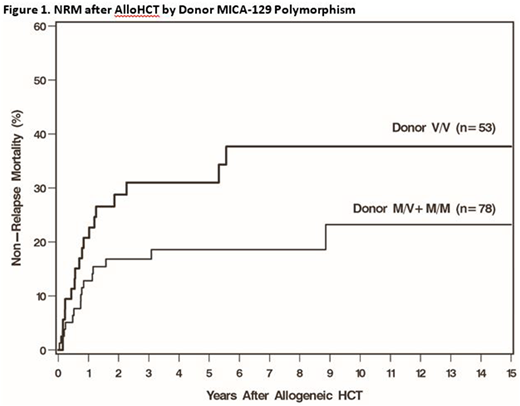Abstract
Background
MHC class I chain-related gene A (MICA) is a polymorphic ligand of the natural killer (NKG2D) receptor on immune effector cells. The activating NKG2D receptor controls immune responses by regulating NK cells, NKT cells and γδ-T cells. Dimorphisms at sequence position 129 of the MICA gene confers varying levels of binding affinity to NKG2D receptor. MICA previously has been associated with post-allogeneic hematopoietic cell transplantation (alloHCT) outcomes including graft-versus-host-disease (GvHD), infection, and relapse. However, it is unclear how MICA interacts with cytogenetic and somatic mutations in regards to these outcomes in acute myeloid leukemia (AML).
Methods
We conducted a single center, retrospective analysis of adult AML patients in first or second complete remission (CR1, CR2), who underwent T-cell replete matched related or unrelated donor alloHCT. Analysis was limited to those who had MICA data available for donors and recipients. In addition to cytogenetic risk group stratification by European LeukemiaNet criteria (Döhner H, et al, Blood 2016), a subset of patients had a 36-gene somatic mutation panel assessed prior to alloHCT by next-generation sequencing. Dimorphisms at the MICA-129 position have previously been categorized as weaker (valine/valine: V/V), heterozygous (methionine/valine: M/V), or stronger (methionine/methionine: M/M) receptor binding affinity. Fine and Gray or Cox regression was used to identify the association of MICA and outcomes with results as hazard ratios (HR) and 95% confidence intervals (CI).
Results
From 2000 - 2017, 131 AML patients were identified meeting inclusion criteria. Median age at transplant was 54 years (18-74), with 98% Caucasian. Disease status at transplant included 78% CR1 and 22% CR2. Cytogenetic risk stratification showed 13% of patients as favorable, 56% as intermediate, and 31% as adverse-risk. The five most common somatic mutations were FLT3 (15%), NPM1 (14%), DNMT3A (11%), TET2 (7%), and NRAS (6%). 60% of patients had a related donor. A myeloablative transplant was performed in 84% of patients and 53% had a bone marrow graft source. The most common conditioning regimen used was busulfan/cyclophosphamide (52%). 12% of patients were MICA mismatched with their donor. The distribution of donor MICA-129 polymorphisms were 41% V/V, 53% M/V, and 6% M/M.
In univariable analysis, donor-recipient MICA mismatch tended to be associated with a lower risk of infection (HR 0.49, CI 0.23-1.02, P=0.06) and grade 2-4 acute GvHD (HR 0.25, CI 0.06-1.04, P=0.06) but was not associated with other post-transplant outcomes. In multivariable analysis, donor MICA-129 V/V was associated with a higher risk of non-relapse mortality (NRM) (HR 2.02, CI 1.01-4.05, P=0.047) (Figure 1) along with increasing patient age at transplant (HR 1.46, CI 1.10-1.93, p=0.008) and the presence of a TET2 mutation (HR 6.00, CI 1.77-20.3, P=0.004). There were no differences between the V/V and the M/V+M/M cohorts regarding somatic mutational status, cytogenetics and other pre-transplant characteristics and post-transplant outcomes. With a median follow-up of 65 months for both cohorts, 45% vs. 49% of patients remain alive, respectively. The most common causes of death between the V/V and the M/V+M/M cohorts was relapse (38% vs. 62%) and infection (31% vs. 8%), respectively.
Conclusion
While previous studies have demonstrated associations of somatic mutations and cytogenetics with survival outcomes after alloHCT for AML, we observed mutations in TET2 and the V/V donor MICA-129 polymorphism to be independently prognostic for NRM. Mechanistic studies may be considered to assess for possible interactions of TET2 mutations with NK cell alloreactivity. The weaker binding affinity to the NKG2D receptor by the V/V phenotype may diminish immune responses against pathogens that subsequently contribute to higher NRM. These observations may have implications for enhancing patient risk stratification prior to transplant and optimizing donor selection. Future investigation with larger cohorts interrogating pre-transplant AML somatic mutations with MICA polymorphisms on post-transplant outcomes may further elucidate which subsets of patients may benefit most from transplant.
Nazha:MEI: Consultancy. Mukherjee:Pfizer: Honoraria; Novartis: Consultancy, Membership on an entity's Board of Directors or advisory committees, Research Funding; Projects in Knowledge: Honoraria; BioPharm Communications: Consultancy; Bristol Myers Squib: Honoraria, Speakers Bureau; Takeda Pharmaceuticals: Membership on an entity's Board of Directors or advisory committees; Takeda: Membership on an entity's Board of Directors or advisory committees; LEK Consulting: Consultancy, Honoraria; Aplastic Anemia & MDS International Foundation in Joint Partnership with Cleveland Clinic Taussig Cancer Institute: Honoraria. Advani:Amgen: Research Funding; Pfizer: Honoraria, Research Funding; Glycomimetics: Consultancy; Novartis: Consultancy. Carraway:Novartis: Speakers Bureau; Balaxa: Membership on an entity's Board of Directors or advisory committees, Speakers Bureau; Jazz: Speakers Bureau; FibroGen: Consultancy; Celgene: Membership on an entity's Board of Directors or advisory committees, Research Funding, Speakers Bureau; Amgen: Membership on an entity's Board of Directors or advisory committees; Agios: Consultancy, Speakers Bureau. Gerds:Apexx Oncology: Consultancy; Celgene: Consultancy; Incyte: Consultancy; CTI Biopharma: Consultancy. Sekeres:Celgene: Membership on an entity's Board of Directors or advisory committees; Opsona: Membership on an entity's Board of Directors or advisory committees; Celgene: Membership on an entity's Board of Directors or advisory committees; Opsona: Membership on an entity's Board of Directors or advisory committees. Maciejewski:Apellis Pharmaceuticals: Consultancy; Ra Pharmaceuticals, Inc: Consultancy; Alexion Pharmaceuticals, Inc.: Consultancy, Membership on an entity's Board of Directors or advisory committees, Speakers Bureau; Ra Pharmaceuticals, Inc: Consultancy; Alexion Pharmaceuticals, Inc.: Consultancy, Membership on an entity's Board of Directors or advisory committees, Speakers Bureau; Apellis Pharmaceuticals: Consultancy. Majhail:Incyte: Honoraria; Anthem, Inc.: Consultancy; Atara: Honoraria.
Author notes
Asterisk with author names denotes non-ASH members.


This feature is available to Subscribers Only
Sign In or Create an Account Close Modal